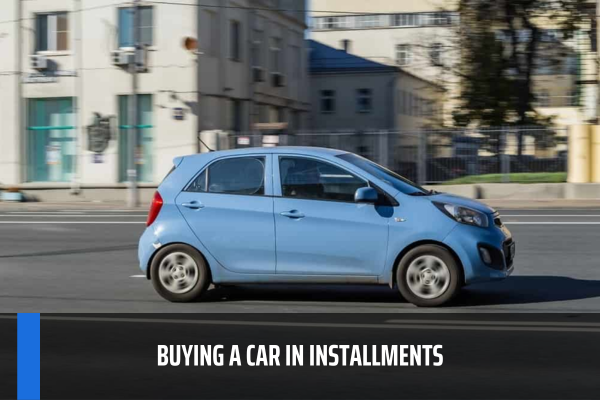What is the order and procedures for buying a car in installments in Vietnam? Who is the owner of the car in installments?
What is the order and procedures for buying a car in installments in Vietnam?
The procedure for buying a car in installments at the bank will be carried out with the following steps:
Step 1: The buyer provides complete and accurate documents required by the bank
Step 2: The bank will conduct an appraisal of the file
After appraisal, if there are missing documents, the bank will request additional documents. If the documents are complete, the bank will approve the loan and notify the loan guarantee.
Step 3: Pay counterpart money and register the vehicle
The car buyer pays a corresponding amount to the car company to issue an invoice and send documents to complete the procedures for paying registration tax, printing license plates, and registering.
Step 4: Sign the loan contract
After receiving the license plate and the original vehicle registration, the buyer brings those documents to the bank to sign the loan contract. At the same time, pay the relevant fees and have the documents notarized and sign the debt receipt from the bank.
Step 5: Receive the car
After signing the contract, the bank will provide a copy of the vehicle registration and transfer money to the car dealer. Finally, the buyer goes to the dealership to pick up the car and complete the transaction.
*Note: The above content is for reference only.

What is the order and procedures for buying a car in installments in Vietnam? Who is the owner of the car in installments? (Picture from internet)
Who is the owner of the car in installments in Vietnam?
Pursuant to the provisions of Article 453 of the 2015 Civil Code, regulations on purchases by deferred payment or payment in instalments are as follows:
Purchases by deferred payment or payment in instalments
1. Parties may agree that the purchaser may purchase by deferred payment or payment in instalments of the purchase price within a time limit after delivery of the purchased property. The seller has title retention of the property sold until the purchaser has paid the purchase price in full, unless otherwise agreed.
2. Contracts for purchase by deferred payment or payment in instalments shall be made in writing. The purchaser may use the property purchased by deferred payment or payment in instalments and bear all risks during the period of use, unless otherwise agreed.
So, based on the above regulations, when buying a car in installments, the seller has title retention of the property sold until the purchaser has paid the purchase price in full. This means that the car buyer only has the right to use the car without the right to own or dispose of the car during the installment payment period, unless otherwise agreed.
What is the current vehicle registration procedure in Vietnam?
Pursuant to Article 12 of Circular 24/2023/TT-BCA, the regulations are as follows:
Procedures for initial vehicle registration
1. Organizations and individuals shall carry out procedures for initial vehicle registration according to regulations in Article 9 of this Circular; they shall bring their vehicles to vehicle registration authorities and submit documents specified in Article 10 and Article 11 of this Circular.
2. After vehicle registration officers inspect vehicle registration applications and conduct physical inspection of vehicles, if these applications and vehicles are satisfactory, license plates shall be issued as follows:
a) New license plates shall be issued to owners who have not yet been issued with identification license plates or owners who have been issued with identification license places that are being used for registration of other vehicles.
b) Identification license plates shall be re-issued if such license plates have been revoked.
In case vehicles and their applications does not meet regulations, it is required to supplement and complete these applications according to guidelines from vehicle registration officers in application guideline notes.
3. The applicant may receive the appointment note to return vehicle registration result, pay vehicle registration fee and receive license plate (in case the license plate is issued according to regulations in point a, Clause 2 of this Article); if the vehicle owner wishes to receive vehicle registration result by post, it/he/she shall register with the public post office;
4. The applicant may receive the vehicle registration certificate and the license plate (in case the license plate is issued according to regulations in point b, Clause 2 of this Article) in person at the vehicle registration authority or by post.
Thus, according to the above regulations, current vehicle registration procedure is carried out according to the following steps:
Step 1: The vehicle owners shall log into the public service portal and be responsible for declaring full contents specified in the vehicle registration form; then bring their vehicles to vehicle registration authorities and submit documents.
Step 2: After vehicle registration officers inspect vehicle registration applications, if these applications and vehicles are satisfactory, license plates shall be issued.
In case vehicles and their applications does not meet regulations, it is required to supplement and complete these applications according to guidelines from vehicle registration officers in application guideline notes.
Step 3: The applicant may receive the appointment note to return vehicle registration result, pay vehicle registration fee and receive license plate; if the vehicle owner wishes to receive vehicle registration result by post, it/he/she shall register with the public post office;
Step 4. The applicant may receive the vehicle registration certificate and the license plate (in case the license plate is reissued) in person at the vehicle registration authority or by post.
LawNet